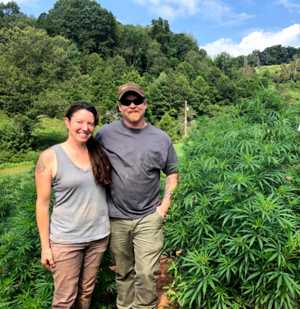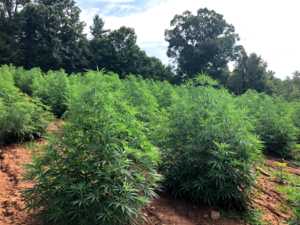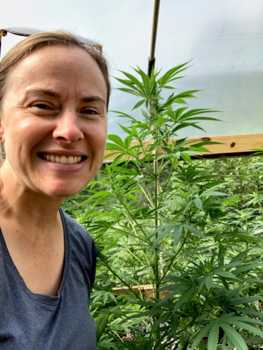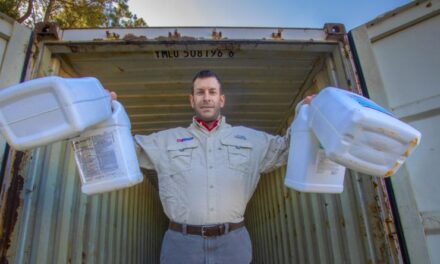In Madison County, hemp is here to stay

The hype has died down, but Extension continues to help farmers make their way with the new cash crop.

Ashley and Seth Thomas grow hemp in a greenhouse and on about one and half acres of their farm near Mars Hill in Madison County. Although a glut has lowered demand, Ashley has reached out to local retailers to find new markets for her CBD body products.
MARS HILL – When hemp became a legal cash crop in 2018, many small farmers took notice.
The hemp plant – prized for its fiber and the source of CBD oil that is found in many medicinal and beauty products – looked to be a viable alternative crop, and growers who had left tobacco behind after deregulation were especially interested in its potential.
“We were the number one burley tobacco producer in North Carolina for decades,” said Elizabeth Ayers, the agriculture and natural resources agent in Madison County with Cooperative Extension at N.C. A&T. “That changed in 2004 with the tobacco buyout (the Tobacco Transition Payment Program, which deregulated tobacco growing). With hemp legal, we had a lot of farmers who realized the methods were really similar. They had the barns, the right equipment, the greenhouses.”
Now Madison County has one of the highest concentrations of hemp farmers in North Carolina, with over 80 registered growers. In the past year, Ayers has conducted two meetings for growers with more than 200 attendees, a panel discussion, and meetings using the Zoom collaborative platform. N.C. A&T’s first hemp conference brought together more than 250 farmers, industry partners, and Extension staff on the N.C. A&T campus in January 2020. Ayers estimates she meets about once a week with a farmer interested in growing hemp.
“After meeting with some farmers who have experience with growing crops, they are ready to start growing and others are curious and need to know more,” she said. Cooperative Extension programs assist hemp farmers with everything from marketing to soil and nutrition management to understanding and complying with industry regulations. For example, hemp flowers must be tested to make sure their levels of THC are 0.3 percent or less. THC is the compound in marijuana that gives people a high. Marijuana plants, compared to hemp, have THC levels between 5 and 25 percent.
And while the new crop has not yet proven to be the game changer that some farmers hoped it would be – a glut in the market has left many farmers with extra product this year—hemp farming seems to have taken a permanent place among the many crops grown in North Carolina.
“The hemp bubble did burst, but we are still conducting research and making sure that information gets into the hands of our farmers so that they can make the best decisions,” said Ayers. She added that despite the market glut, the desire to diversify or to use an existing greenhouse or fallow land for hemp production still attracts farmers to the crop.
Growing hemp by the book
Ashley and Seth Thomas, who own about 20 acres near Mars Hill, decided to convert about an acre and half and a 50-foot greenhouse to hemp farming in 2019. They turned to their local Extension professionals to make sure they followed all laws and best practices. Ayers provided information about upcoming meetings, marketing opportunities, different strains of hemp, and the laws regulating the industry, including how to register as a hemp farmer. Sue Estridge, the family and consumer sciences agent at the Madison County Extension Center, helped Ashley Thomas decipher the rules and regulations for selling CBD body products.

The hills of Madison County have one of the highest concentrations of hemp farmers in North Carolina, with more than 80 registered growers. Extension at A&T assists hemp growers with information on best growing practices, the best strains to grow, and how to comply with state regulations.
“We wanted to do everything by the book,” said Thomas. “Extension helped me learn the laws and what strains work best in our area. I needed to get a processor’s license, and I needed to know what the options were for selling different products, such as tinctures, salves and other body products.”
Thomas processes her own hemp, which involves distilling the plant in alcohol to separate the CBD oil from the super concentrated black resin. The crude CBD oil is sent to a state-run lab so that she knows its exact chemical makeup and to ensure the THC level isn’t too high. The CBD oil can then be mixed with other oils and butters to make salves, massage oils and other products that are commonly used to soothe pain, reduce inflammation and manage anxiety.
Thomas created her own company, called Carolina Creek Fire, LLC, and now sells regularly at the Mars Hill Farmers Market. She also sells her products at T.J.’s Mountain Market in Mars Hill and plans to sell at High Country Vapor and Silver Mill Feed Store, both in Mars Hill.
“It’s been a lot of work and a pretty tough year, but we are getting the word out,” she said. “Every week at the farmer’s market we sell a little more, and we have people coming back.”
Tina Jones, owner of T.J.’s Mountain Market sells hemp products from Big Ivy Naturals, the farm owned and operated by her husband and sons, and she added Thomas’s products in 2019.
“I don’t do salves, so I get the salves from Ashley,” said Jones. “I like to work with local farmers and be part of a local community of growers and sellers. But mostly, I’ve tried her product and it’s a good product. That’s my main motivation.”
Farming is a gamble

Elizabeth Ayers, Extension agriculture and natural resources agent in Madison County, is flanked by hemp plants on the farm of Ashley and Seth Thomas. Madison County has become a hemp growing hub since the crop became legal, with Ayers estimating she meets with a farmer interested in hemp production about once a week.
Jones described her family as displaced tobacco farmers who decided to add hemp to the mix of crops they grow.
“We saw it wasn’t going to be the next golden leaf, so we adjusted,” she said. “We grow mainly to sell at our store. Farming is a gamble no matter what your crop is. You change and adjust. It’s the love of farming that keeps you going.”
As for Thomas, her current plans are to grow a little bit less in the coming year, expand her customer base, and educate her customers on the benefits of the two strains of hemp she and her husband currently grow. Customers report that the strains, Cherrywine and Chardonnay, help with inflammation and the pain often associated with sore and inflamed joints. She said she will continue to turn to Cooperative Extension for help as the hemp industry in western North Carolina continues to evolve.
“Without Elizabeth’s help, I would’ve spent a lot of time on the phone with people in Raleigh,” she said of her efforts to get started in hemp production. “She was like a library; I would ask her something and she would give me the information and refer me to more. She was a direct link to support and to grant opportunities, and that’s huge because you don’t feel like you’re alone. When you’re taking a risk, you need to have people who are there for you and want to help you.”
